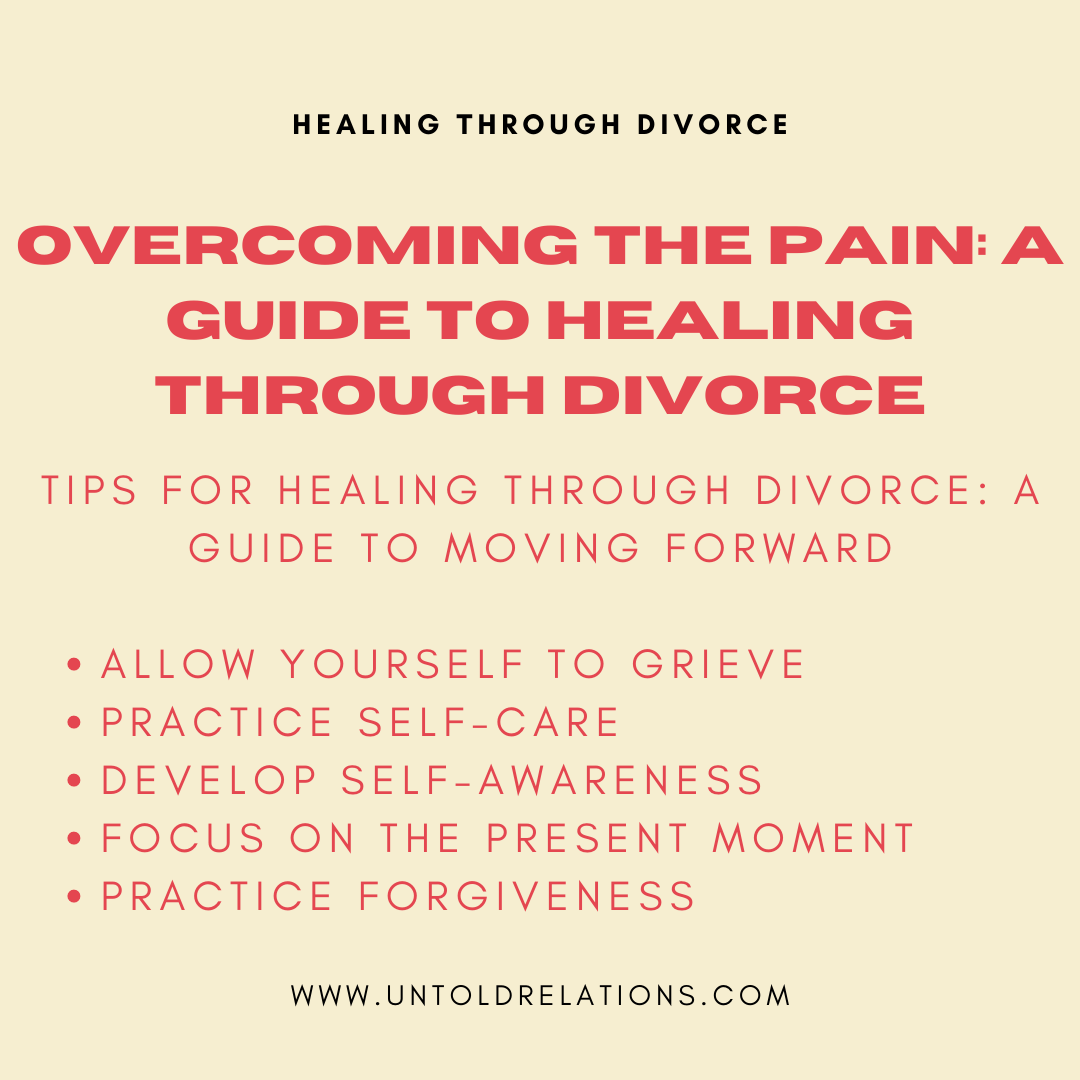Divorce is a painful and challenging experience that can leave emotional scars on both partners and their families. However, it can also be an opportunity for healing and personal growth. Healing through a divorce is a process that involves acknowledging and processing emotions, developing self-awareness, and creating a positive vision for the future. While divorce is undoubtedly difficult, it can also be an opportunity for positive change and a chance to build a fulfilling new life. Healing through divorce is not only possible but also necessary for individuals to move on and create new chapter in their lives for better future.

5 Tips for Healing Through Divorce: A Guide to Moving Forward
Living in the present moment can bring acceptance, gratitude, and resilience to the healing journey after divorce.
Allow Yourself to Grieve
Going through a divorce is a significant life transition that can be emotionally challenging. It’s important to acknowledge and accept the range of emotions that come with this experience, including sadness, anger, and confusion. Allowing yourself to grieve is an essential part of healing through divorce.
Grief is a natural response to loss, and it can be experienced in different ways. Some people may feel numb or in shock, while others may feel intense emotions that come in waves. It’s important to remember that there is no right or wrong way to grieve. Everyone experiences it differently, and there is no timeline for how long the process takes.
Allowing yourself to grieve means giving yourself permission to feel and express your emotions. This can be challenging, especially if you’re used to suppressing your feelings or if you feel like you need to be strong for others. However, bottling up your emotions can lead to further distress and delay the healing process.
Practice Self-Care
Practicing self-care is an essential part of healing through a divorce. Divorce can be emotionally and physically exhausting, and taking care of yourself can help you navigate this challenging time more effectively. Self-care involves engaging in activities that promote your well-being and nourish your body, mind, and spirit.
Self-care can take many forms, such as exercise, meditation, spending time in nature, getting enough sleep, or engaging in creative hobbies. It’s important to prioritize self-care as a regular part of your routine, even if it’s just a few minutes a day.
By practicing self-care, you’re sending a message to yourself that you’re worth investing time and energy into. Remember that taking care of yourself is not selfish, but rather a necessary component of healing and moving forward.
Develop Self-Awareness
Developing self-awareness is an important aspect of healing through a divorce. Divorce can challenge your sense of identity, and developing self-awareness can help you understand your needs, values, and goals. Self-awareness involves being honest with yourself about your thoughts, feelings, and behaviors. It requires self-reflection, self-exploration, and a willingness to face your fears and limitations.
Developing self-awareness can involve practices such as journaling, therapy, meditation, or spending time alone in nature. Developing self-awareness is a journey, and it’s okay to take small steps toward this goal. By focusing on self-awareness, you are creating a foundation for your healing journey and setting the stage for a more fulfilling future.
Focus on the Present Moment
Focusing on the present moment is an important aspect of healing through a divorce. Divorce can bring up a range of emotions, including regret about the past and fear or uncertainty about the future. However, dwelling on the past or worrying about the future can prevent you from fully experiencing the present moment and can hinder your healing process.
Focusing on the present moment involves bringing your attention to the present and engaging with your current experience. It’s all about accepting and acknowledging your emotions without judgment or resistance. By focusing on the present moment, you are allowing yourself to experience life as it is, rather than as you wish it to be.
Practice Forgiveness
Practicing forgiveness is an important aspect of healing through a divorce. Divorce can bring up feelings of hurt, anger, and resentment, and forgiveness can help release these emotions and promote healing. Forgiveness does not mean forgetting hurtful actions, but rather, it’s about letting go of negative feelings and choosing to move forward.
Forgiveness can be a challenging practice, but by practicing forgiveness, you are not only releasing negative emotions but also cultivating empathy, compassion, and understanding. This can support your healing journey and allow you to move forward with greater peace and freedom.
Tips for Healing and Moving Forward After Divorce
- Practice self-care
- Seek support
- Develop self-awareness
- Focus on the present moment
- Practice forgiveness
- Set boundaries
- Take time for yourself
- Reflect on the lessons learned from the divorce
- Surround yourself with positive influences
- Build a support network of trusted friends and family
- Avoid negative self-talk
- Learn from mistakes and don’t dwell on them
- Take care of your physical health
- Create a routine and stick to it
- Explore new hobbies or interests
- Set realistic goals and work towards them
- Practice gratitude and focus on the good things in life
Final Thought
Healing after divorce is a journey that can take time and effort, but by utilizing these tips, it’s possible to move forward with greater peace, resilience, and self-awareness. It’s important to remember that everyone’s healing journey is unique, and what works for one person may not work for another. It’s okay to take small steps toward healing and to seek support when needed. Remember, the end of a relationship is not the end of your story, but rather, the beginning of a new chapter filled with possibilities and opportunities for growth.



0 Comments